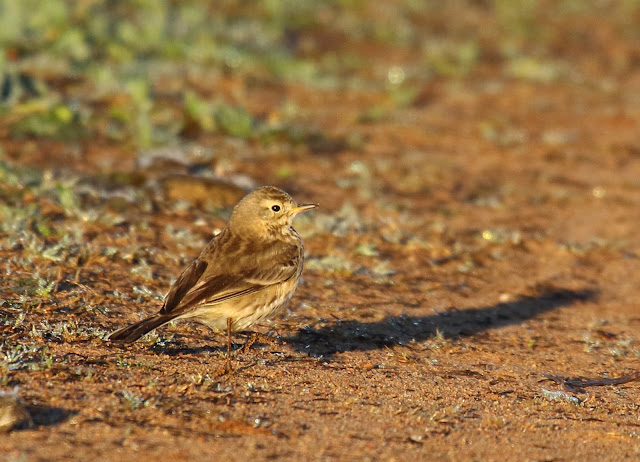But they breed in Arctic tundra and tundra-like vegetation above tree line in the highest mountains. From Greenland and Newfoundland to Alaska they breed southward in the Rocky Mountains to a few tall peaks in New Mexico, Arizona, California, and just across the border into Baja Mexico (Sierra San Pedro Martir). None of the peaks in San Diego are tall enough for breeding pipits, at only 5000 feet elevation.
Every fall they move out of the tundra and head south to get out of the snow. Some to the southern United States (and coast-to-coast, from British Columbia to New Jersey) and south all the way to El Salvador.
 |
| American Pipit. Lake Hodges, California. January 25, 2019. |
Well, hello, Google! I guess I'm not the first to wonder about this. Let me read the article I just found and report back in a few minutes...
… So Jon H. Miller and Michael T. Green wrote an article in The Condor in 1987 titled, appropriately: "Distribution, Status, and Origin of Water Pipits Breeding in California." Ah, yes, for a while in the 1980's a whole bunch of lumping went on. I think this was when we briefly had Green-backed Herons and Black-shouldered Kites (and still have Northern Harriers). Remember? American Pipits (Anthus rubescens) were combined with pipits in Europe and Asia and called Water Pipits (Anthus spinoletta). The American form was considered as a subspecies of Water Pipit. They have been split back out and recognized as a unique species now. So when reading that article, keep the change in scientific nomenclature in mind.
So, this is interesting. From Alaska to Oregon the breeding race of American Pipit is A. r. pacificus. They winter commonly throughout California.
However, the breeding race in the Sierra-Nevada and San Gorgonio Mountain in southern California? Not A. r. pacificus. Instead, they are the Rocky Mountain form A. r. alticola. Even though American Pipits are fairly common breeders in high mountains in California, this has only been true since the 1970's--they were previously absent. So, not what was expected at all. That's often true in nature, and part of what makes bird watching so interesting.
More photos of American Pipit in San Diego from eBird. Click on the photos to rate (1 awful, 2 poor but identifiable, 3 average or small, 4 very good, 5 magazine cover worthy).

No comments:
Post a Comment
I really want to hear from you! I've changed settings (again) in order to try to make commenting easier without opening it up to spammers. Please note, however, that comments to posts older than 14 days will be moderated. Thank you.